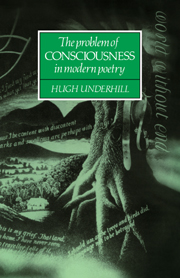Book contents
- Frontmatter
- Contents
- Preface
- Introduction: the inward revolution
- 1 From Georgian origins to ‘Romantic primitivism’: D. H. Lawrence and Robert Graves
- 2 Strangers to nature: modern nature poetry and the rural myth
- 3 The ‘poetical character’ of Edward Thomas
- 4 ‘Myself must I remake’: W. B. Yeats
- 5 ‘Here and now cease to matter’: T. S. Eliot
- 6 The work of Man: Louis MacNeice and W. H. Auden
- 7 ‘Nothing of our light’: Ted Hughes
- Conclusion
- Notes
- Select bibliography
- Index
5 - ‘Here and now cease to matter’: T. S. Eliot
Published online by Cambridge University Press: 18 December 2009
- Frontmatter
- Contents
- Preface
- Introduction: the inward revolution
- 1 From Georgian origins to ‘Romantic primitivism’: D. H. Lawrence and Robert Graves
- 2 Strangers to nature: modern nature poetry and the rural myth
- 3 The ‘poetical character’ of Edward Thomas
- 4 ‘Myself must I remake’: W. B. Yeats
- 5 ‘Here and now cease to matter’: T. S. Eliot
- 6 The work of Man: Louis MacNeice and W. H. Auden
- 7 ‘Nothing of our light’: Ted Hughes
- Conclusion
- Notes
- Select bibliography
- Index
Summary
My reasons for choosing to discuss T. S. Eliot at some length don't only have to do with his unavoidabihty on the map of modern poetry. He strikes me as the central case; to express in its acutest form a ‘problem of consciousness’ at the heart of the modern experience, a perception of consciousness as utterly amorphous and disordered, powerless to yield meaning. My theme in this chapter is the peculiar interdependence in Eliot between what I take to be the intensely personal sources of his poetry and the way he has appeared to speak for his time – a kind of oracle indeed. Like Yeats he is always seeking the inclusive consciousness, to wear the mask of the man who has ‘known it all’, but without the Yeatsian readiness to balance world and otherworld; rather, with the effect of a kind of cancelling-out, so that ‘here and now cease to matter’. Perhaps more than any poet he presents a case of loss of trust in the fruits of experience, a sense of the futility of action, of intervention in history; a turning elsewhere in quest of meanings – elsewhere being both ‘inward’ and ‘beyond’. In his biography of Eliot Peter Ackroyd writes, in sentences which suggest the necessity of biographical study of Eliot:
His own need for order reflected that which existed among his generation; his own fears of fragmentation and meaninglessness (‘the Void’) were also theirs.
- Type
- Chapter
- Information
- The Problem of Consciousness in Modern Poetry , pp. 145 - 214Publisher: Cambridge University PressPrint publication year: 1992



